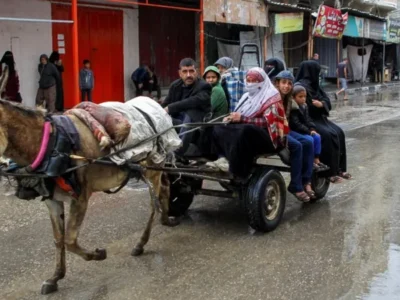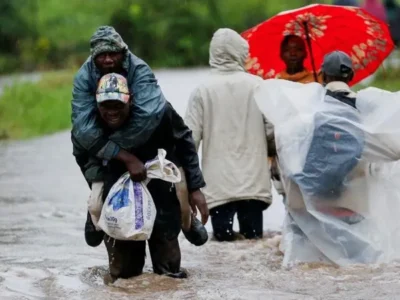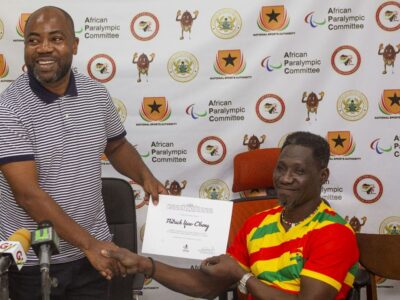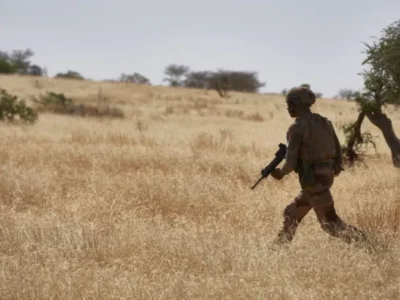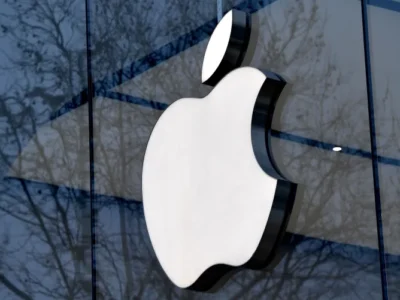
Dressed in his signature closed-neck suit, Pastor Chris Oyakhilome stared directly into the camera, declaring that “there was never a proof that vaccines ever worked”.
Everyone had been “lied to” about vaccination, he said in the sermon broadcast on his church’s YouTube channel in February.
Known as “Pastor Chris”, the sixty-year-old is one of Africa’s best-known evangelical preachers.
The BBC has reviewed dozens of his sermons from 2023 and 2024 and found that he has been spreading anti-vaccine messages to his followers, specifically targeting the new malaria vaccine as it is being distributed in African countries.
Malaria is a huge problem in Africa. About 95% of malaria-related deaths occurred on the continent in 2022, with children under five accounting for around 80% of the deaths, according to the World Health Organization (WHO).
In the last six months, Pastor Oyakhilome’s company has also produced at least five 20-minute anti-vaccine documentaries broadcast in church services or shared on his video streaming platform, evading social media companies’ policies against anti-vaccine content.
The announcement last year of the rollout of a vaccine against malaria – after decades of trying – was hailed by experts as a major achievement that could save tens of thousands of lives.
According to the UN children’s agency, Unicef, successful pilot vaccine campaigns since 2019 in Kenya, Ghana and Malawi caused a 13% drop in the deaths of children of eligible age.
But medical experts fear the influential pastor’s far-reaching sermons might negatively affect vaccine take-up in Africa.
In August last year, he warned in a sermon of “an evil agenda that has been long in the making”.
He then spread a conspiracy theory popular in the anti-vaccine community – that vaccines are a way of “depopulating the world”.
He also falsely said that “malaria was never a problem to those in Africa”.
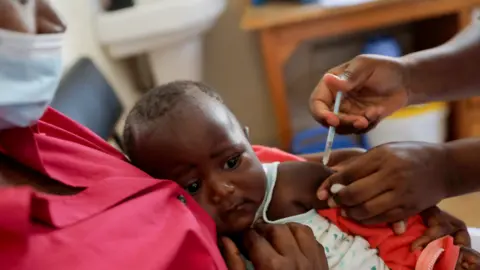
“Spreading false information about vaccines, especially from influential figures like religious leaders, can contribute to the perpetuation of myths and misconceptions, further fuelling vaccine hesitancy.
“This can have devastating consequences for public health, particularly in the WHO African region where vaccine-preventable diseases occur frequently,” a WHO spokesperson said.
Pastor Oyakhilome’s remarks were included as one of the disinformation trends “to watch” ahead of the malaria vaccine rollout in a report released in March by the WHO-backed The Africa Infodemic Response Alliance.
We asked the pastor about his statements against vaccination through his company’s and church’s e-mails. We did not receive a response.
He founded the Christ Embassy church in Nigeria’s main city, Lagos, in the 1990s and went on to amass hundreds of thousands of followers around the world.
In 2011, he was featured in Forbes magazine as one of Nigeria’s richest pastors with an estimated net worth of $30m to $50m (£24m to £40m).
According to the magazine, the pastor’s diverse business interests included newspapers, magazines, a local television station, a record label, satellite TV, hotels and extensive real estate.
His empire, named LoveWorld Inc, has since grown. It now includes a streaming service, a messaging app with over a million downloads on Google’s app store and a microfinance bank.
Once a week, Pastor Oyakhilome preaches at the church’s huge camp ground in Asese, along the Lagos-Ibadan Expressway.
When the BBC visited the church last November, hundreds of pastors from different nationalities filled its auditorium for an annual conference. Flags of dozens of countries were displayed inside.
His “massive online teachings and healing services” have a global attendance of “7 billion people”, according to the Christ Embassy’s website – this is highly unlikely given that the planet’s population is estimated at eight billion.
Winnifred Ikhianosin, 25, is a regular at the church. She told the BBC she refuses to take vaccines.
“The man of God told us,” she said. “And I have also done my research.”
According to Ada Umenwaliri, associate director of the African Studies Centre at the US-based University of North Carolina, Pastor Oyakhilome has a “stronghold on his followers who are looking up to him”.
“Pastors and religious leaders will always play a significant role in the choices their followers make,” she added.
But poverty and the lack of health infrastructure in Africa could enable churches to have a greater hold over people when it came to vaccination, she said.
In an article published on the Nigerian news site, The Cable, last year, writer Julius Ogunro, who attended the pastor’s church for over a decade, said: “We need to sound the alarm now. The agenda [that] Pastor Chris is pushing is potentially dangerous and has nothing to do with the Christian faith.”
One name is repeated frequently by Pastor Oyakhilome: Bill Gates. The billionaire is one of the malaria vaccine’s biggest backers, but has also been subject to vaccination conspiracy theories for years.
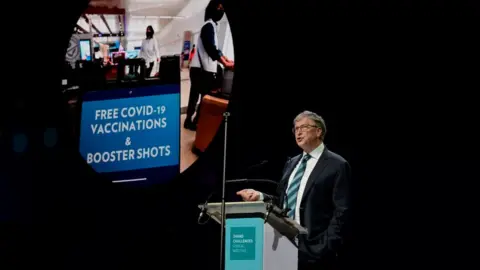
In a sermon in August 2023, the pastor broadcast a clip from a TED talk Bill Gates gave in 2010 as an example of “those who have an agenda for depopulation of the world”.
While giving a talk on reducing carbon dioxide emissions, Mr Gates said: “First, we’ve got population. The world today has 6.8 billion people. That’s headed up to about nine billion. Now, if we do a really great job on new vaccines, health care, reproductive health services, we could lower that by, perhaps, 10 or 15%.”
His declaration was taken out of context by Pastor Oyakhilome. Mr Gates did not advocate for the world’s depopulation.


